Mobile WiMAX Security Analysis
VerifiedAdded on 2020/02/23
|9
|2120
|112
AI Summary
This assignment requires an in-depth analysis of the security mechanisms implemented in the IEEE 802.16e (Mobile WiMAX) standard. Students need to examine both the strengths and weaknesses of these security features, identifying potential vulnerabilities and discussing relevant countermeasures. The analysis should draw upon provided research papers and demonstrate a comprehensive understanding of Mobile WiMAX security concepts.
Contribute Materials
Your contribution can guide someone’s learning journey. Share your
documents today.
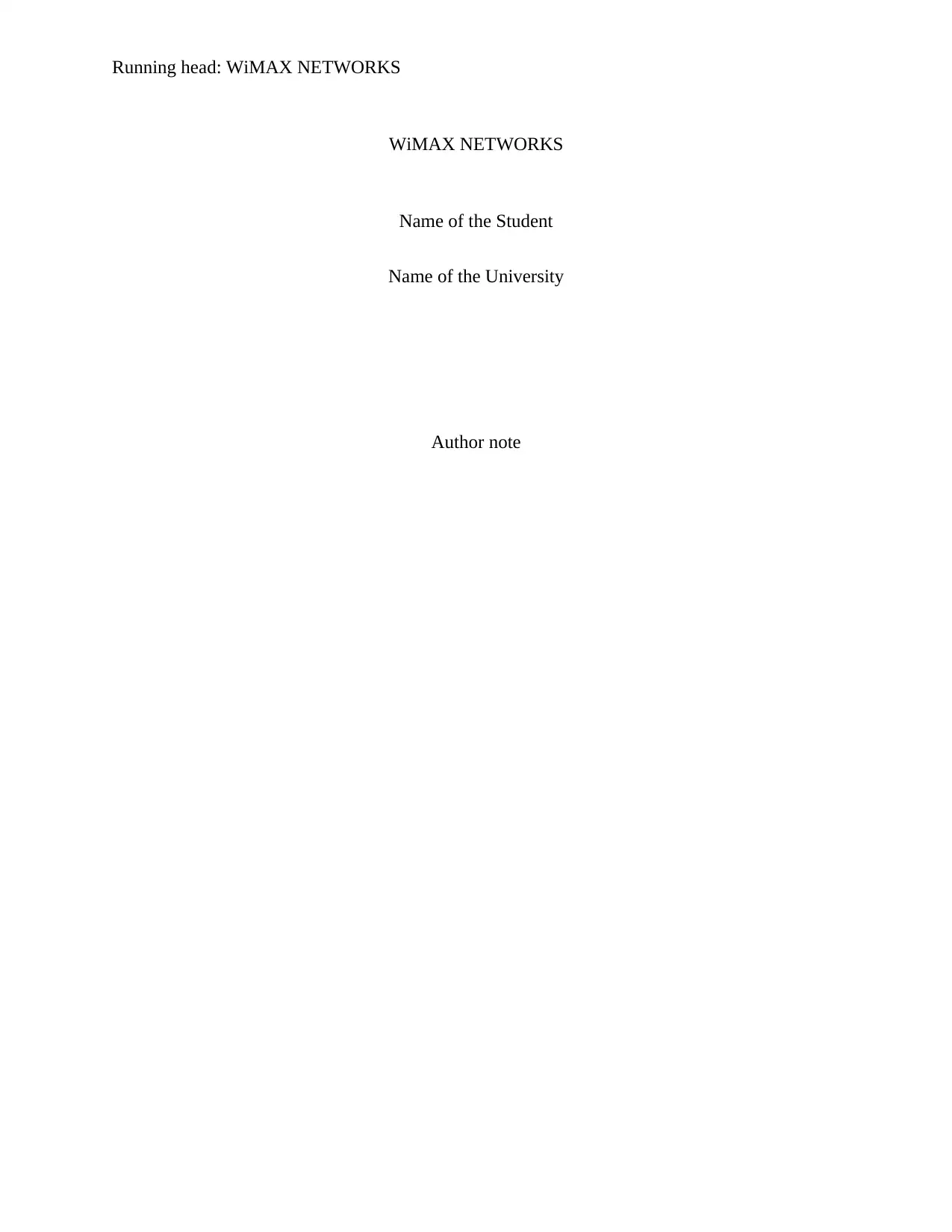
Running head: WiMAX NETWORKS
WiMAX NETWORKS
Name of the Student
Name of the University
Author note
WiMAX NETWORKS
Name of the Student
Name of the University
Author note
Secure Best Marks with AI Grader
Need help grading? Try our AI Grader for instant feedback on your assignments.
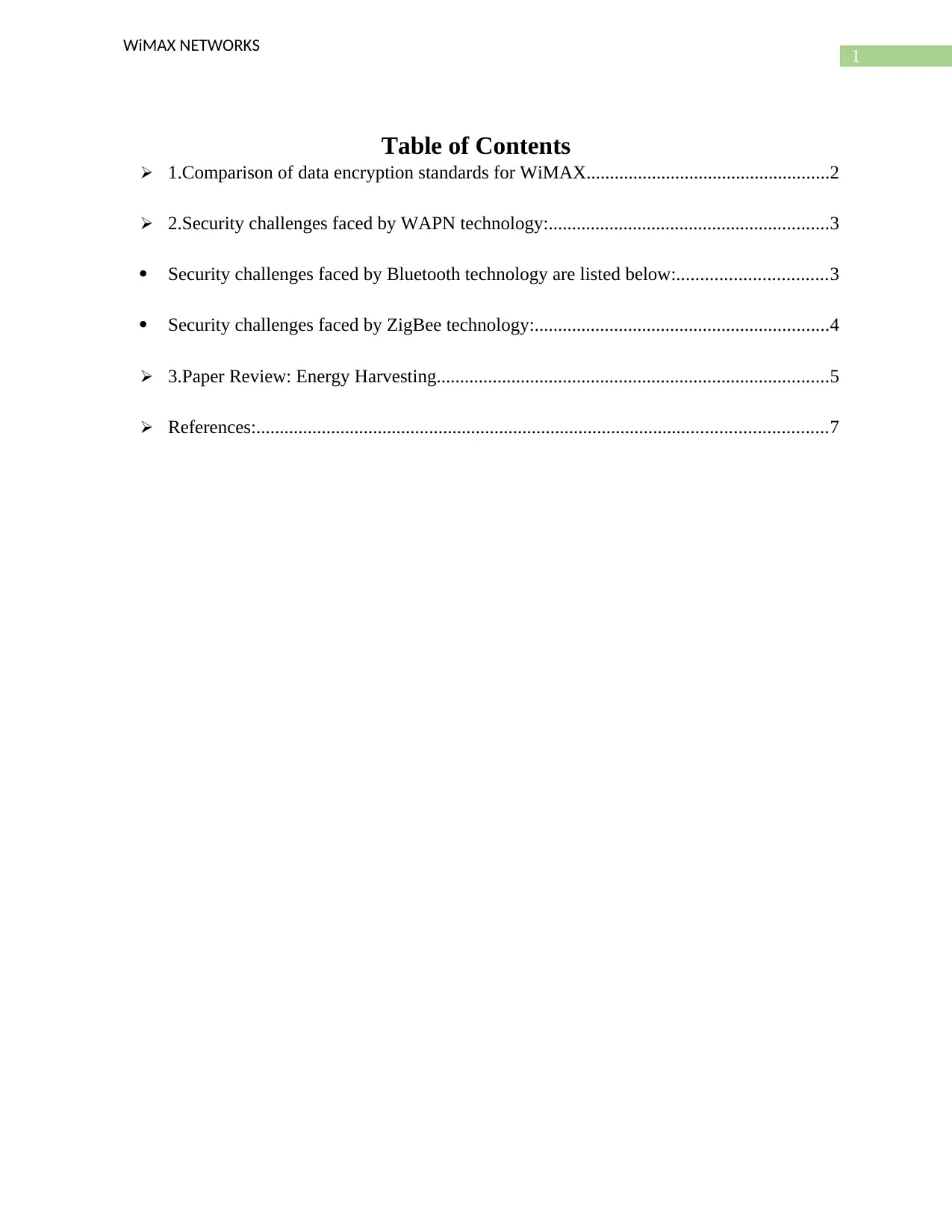
1
WiMAX NETWORKS
Table of Contents
1.Comparison of data encryption standards for WiMAX....................................................2
2.Security challenges faced by WAPN technology:............................................................3
Security challenges faced by Bluetooth technology are listed below:................................3
Security challenges faced by ZigBee technology:...............................................................4
3.Paper Review: Energy Harvesting....................................................................................5
References:..........................................................................................................................7
WiMAX NETWORKS
Table of Contents
1.Comparison of data encryption standards for WiMAX....................................................2
2.Security challenges faced by WAPN technology:............................................................3
Security challenges faced by Bluetooth technology are listed below:................................3
Security challenges faced by ZigBee technology:...............................................................4
3.Paper Review: Energy Harvesting....................................................................................5
References:..........................................................................................................................7
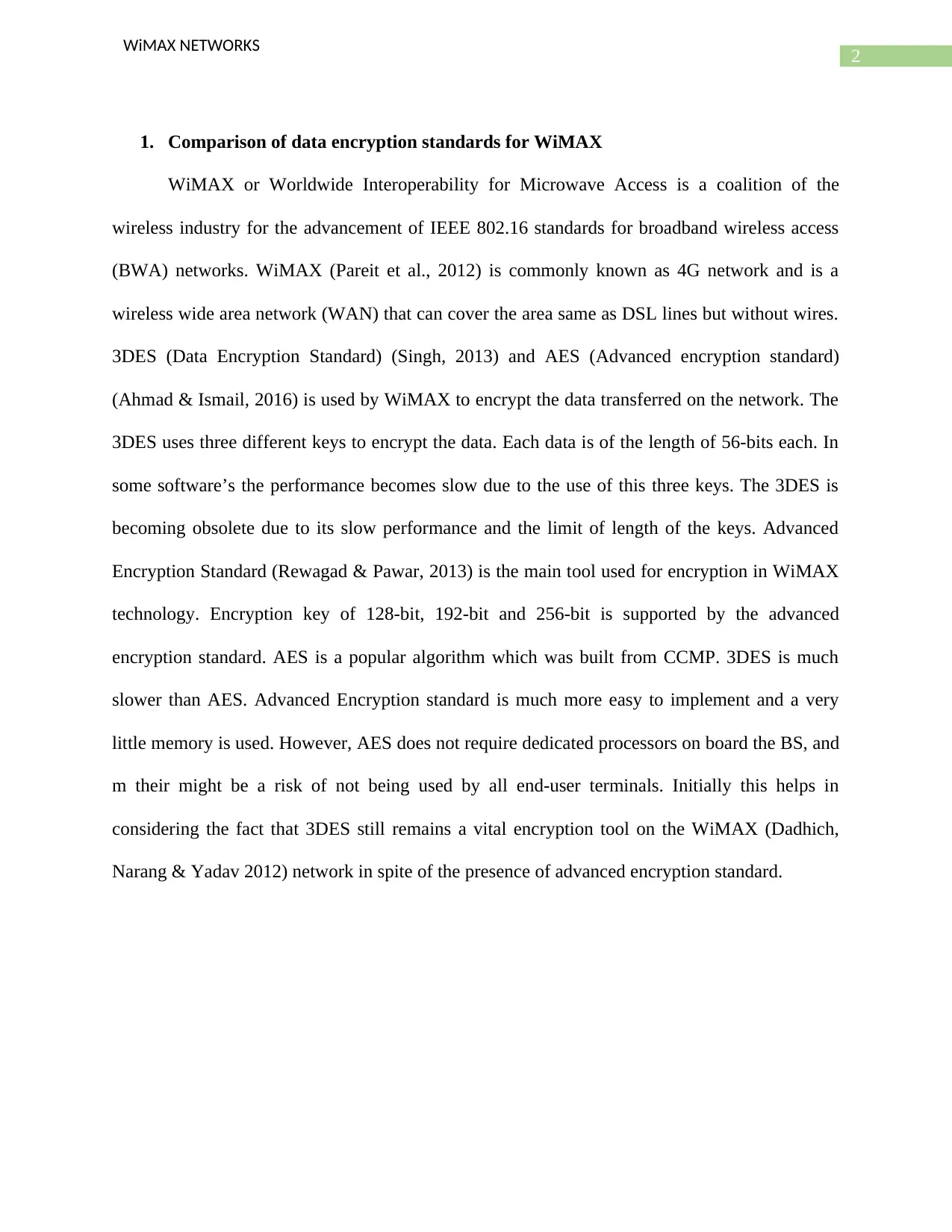
2
WiMAX NETWORKS
1. Comparison of data encryption standards for WiMAX
WiMAX or Worldwide Interoperability for Microwave Access is a coalition of the
wireless industry for the advancement of IEEE 802.16 standards for broadband wireless access
(BWA) networks. WiMAX (Pareit et al., 2012) is commonly known as 4G network and is a
wireless wide area network (WAN) that can cover the area same as DSL lines but without wires.
3DES (Data Encryption Standard) (Singh, 2013) and AES (Advanced encryption standard)
(Ahmad & Ismail, 2016) is used by WiMAX to encrypt the data transferred on the network. The
3DES uses three different keys to encrypt the data. Each data is of the length of 56-bits each. In
some software’s the performance becomes slow due to the use of this three keys. The 3DES is
becoming obsolete due to its slow performance and the limit of length of the keys. Advanced
Encryption Standard (Rewagad & Pawar, 2013) is the main tool used for encryption in WiMAX
technology. Encryption key of 128-bit, 192-bit and 256-bit is supported by the advanced
encryption standard. AES is a popular algorithm which was built from CCMP. 3DES is much
slower than AES. Advanced Encryption standard is much more easy to implement and a very
little memory is used. However, AES does not require dedicated processors on board the BS, and
m their might be a risk of not being used by all end-user terminals. Initially this helps in
considering the fact that 3DES still remains a vital encryption tool on the WiMAX (Dadhich,
Narang & Yadav 2012) network in spite of the presence of advanced encryption standard.
WiMAX NETWORKS
1. Comparison of data encryption standards for WiMAX
WiMAX or Worldwide Interoperability for Microwave Access is a coalition of the
wireless industry for the advancement of IEEE 802.16 standards for broadband wireless access
(BWA) networks. WiMAX (Pareit et al., 2012) is commonly known as 4G network and is a
wireless wide area network (WAN) that can cover the area same as DSL lines but without wires.
3DES (Data Encryption Standard) (Singh, 2013) and AES (Advanced encryption standard)
(Ahmad & Ismail, 2016) is used by WiMAX to encrypt the data transferred on the network. The
3DES uses three different keys to encrypt the data. Each data is of the length of 56-bits each. In
some software’s the performance becomes slow due to the use of this three keys. The 3DES is
becoming obsolete due to its slow performance and the limit of length of the keys. Advanced
Encryption Standard (Rewagad & Pawar, 2013) is the main tool used for encryption in WiMAX
technology. Encryption key of 128-bit, 192-bit and 256-bit is supported by the advanced
encryption standard. AES is a popular algorithm which was built from CCMP. 3DES is much
slower than AES. Advanced Encryption standard is much more easy to implement and a very
little memory is used. However, AES does not require dedicated processors on board the BS, and
m their might be a risk of not being used by all end-user terminals. Initially this helps in
considering the fact that 3DES still remains a vital encryption tool on the WiMAX (Dadhich,
Narang & Yadav 2012) network in spite of the presence of advanced encryption standard.
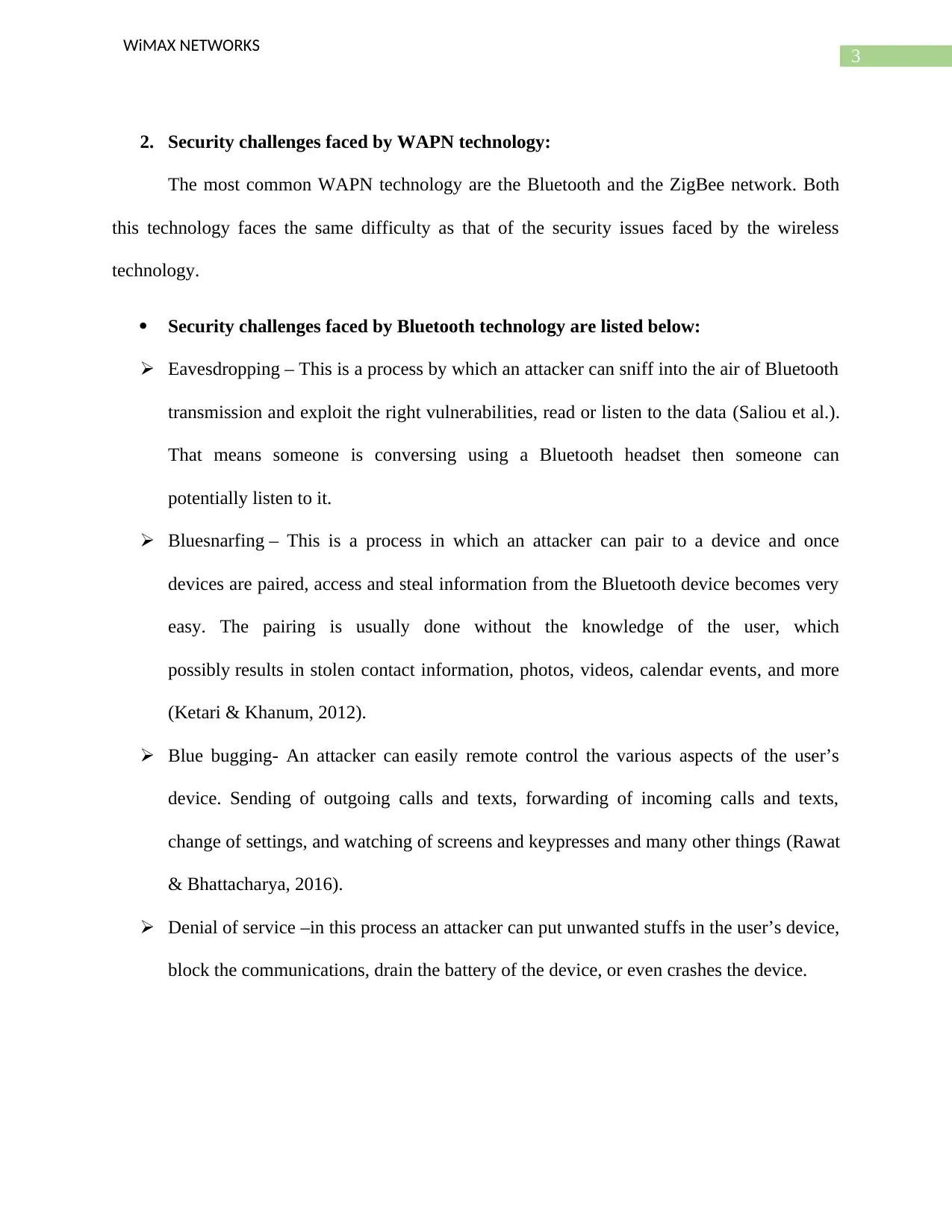
3
WiMAX NETWORKS
2. Security challenges faced by WAPN technology:
The most common WAPN technology are the Bluetooth and the ZigBee network. Both
this technology faces the same difficulty as that of the security issues faced by the wireless
technology.
Security challenges faced by Bluetooth technology are listed below:
Eavesdropping – This is a process by which an attacker can sniff into the air of Bluetooth
transmission and exploit the right vulnerabilities, read or listen to the data (Saliou et al.).
That means someone is conversing using a Bluetooth headset then someone can
potentially listen to it.
Bluesnarfing – This is a process in which an attacker can pair to a device and once
devices are paired, access and steal information from the Bluetooth device becomes very
easy. The pairing is usually done without the knowledge of the user, which
possibly results in stolen contact information, photos, videos, calendar events, and more
(Ketari & Khanum, 2012).
Blue bugging- An attacker can easily remote control the various aspects of the user’s
device. Sending of outgoing calls and texts, forwarding of incoming calls and texts,
change of settings, and watching of screens and keypresses and many other things (Rawat
& Bhattacharya, 2016).
Denial of service –in this process an attacker can put unwanted stuffs in the user’s device,
block the communications, drain the battery of the device, or even crashes the device.
WiMAX NETWORKS
2. Security challenges faced by WAPN technology:
The most common WAPN technology are the Bluetooth and the ZigBee network. Both
this technology faces the same difficulty as that of the security issues faced by the wireless
technology.
Security challenges faced by Bluetooth technology are listed below:
Eavesdropping – This is a process by which an attacker can sniff into the air of Bluetooth
transmission and exploit the right vulnerabilities, read or listen to the data (Saliou et al.).
That means someone is conversing using a Bluetooth headset then someone can
potentially listen to it.
Bluesnarfing – This is a process in which an attacker can pair to a device and once
devices are paired, access and steal information from the Bluetooth device becomes very
easy. The pairing is usually done without the knowledge of the user, which
possibly results in stolen contact information, photos, videos, calendar events, and more
(Ketari & Khanum, 2012).
Blue bugging- An attacker can easily remote control the various aspects of the user’s
device. Sending of outgoing calls and texts, forwarding of incoming calls and texts,
change of settings, and watching of screens and keypresses and many other things (Rawat
& Bhattacharya, 2016).
Denial of service –in this process an attacker can put unwanted stuffs in the user’s device,
block the communications, drain the battery of the device, or even crashes the device.
Paraphrase This Document
Need a fresh take? Get an instant paraphrase of this document with our AI Paraphraser
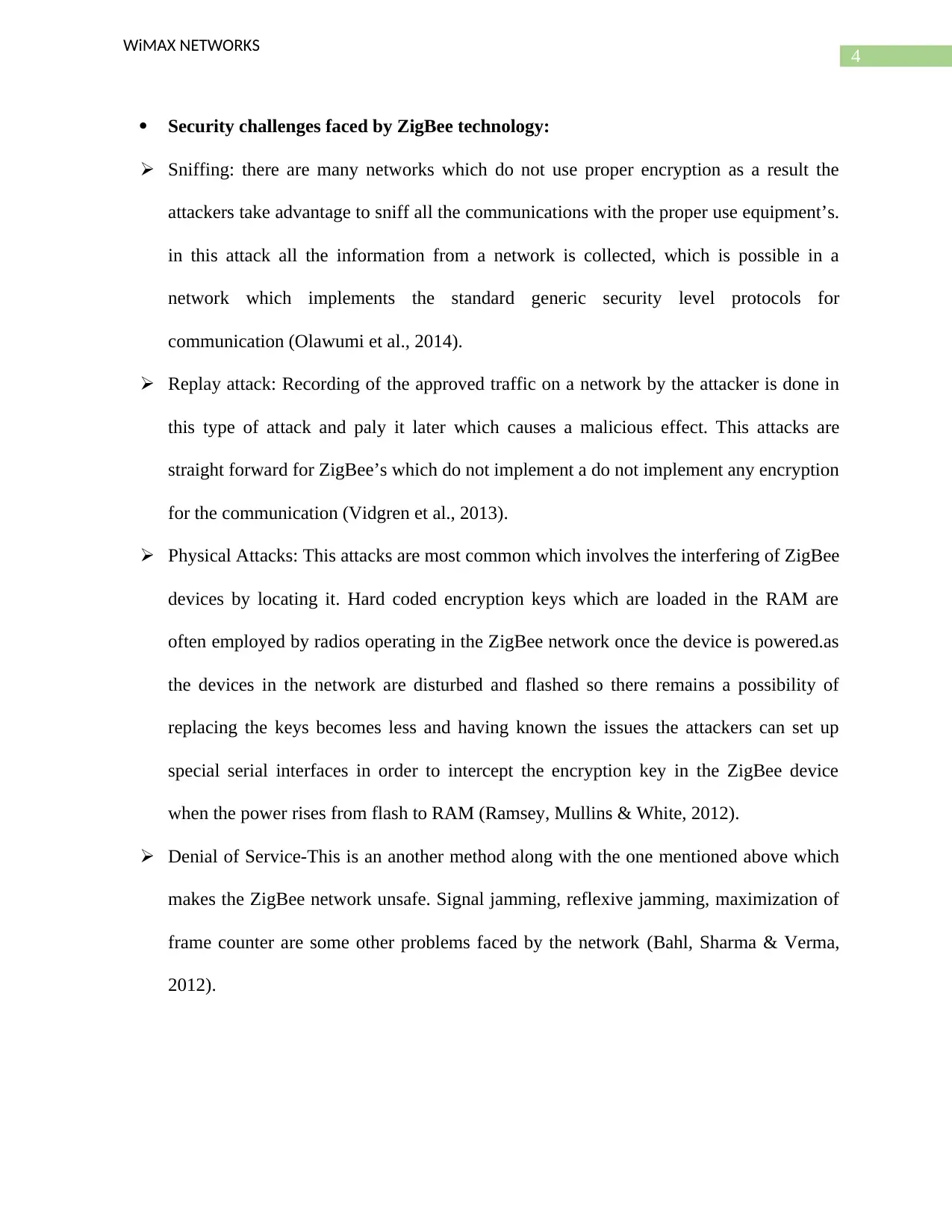
4
WiMAX NETWORKS
Security challenges faced by ZigBee technology:
Sniffing: there are many networks which do not use proper encryption as a result the
attackers take advantage to sniff all the communications with the proper use equipment’s.
in this attack all the information from a network is collected, which is possible in a
network which implements the standard generic security level protocols for
communication (Olawumi et al., 2014).
Replay attack: Recording of the approved traffic on a network by the attacker is done in
this type of attack and paly it later which causes a malicious effect. This attacks are
straight forward for ZigBee’s which do not implement a do not implement any encryption
for the communication (Vidgren et al., 2013).
Physical Attacks: This attacks are most common which involves the interfering of ZigBee
devices by locating it. Hard coded encryption keys which are loaded in the RAM are
often employed by radios operating in the ZigBee network once the device is powered.as
the devices in the network are disturbed and flashed so there remains a possibility of
replacing the keys becomes less and having known the issues the attackers can set up
special serial interfaces in order to intercept the encryption key in the ZigBee device
when the power rises from flash to RAM (Ramsey, Mullins & White, 2012).
Denial of Service-This is an another method along with the one mentioned above which
makes the ZigBee network unsafe. Signal jamming, reflexive jamming, maximization of
frame counter are some other problems faced by the network (Bahl, Sharma & Verma,
2012).
WiMAX NETWORKS
Security challenges faced by ZigBee technology:
Sniffing: there are many networks which do not use proper encryption as a result the
attackers take advantage to sniff all the communications with the proper use equipment’s.
in this attack all the information from a network is collected, which is possible in a
network which implements the standard generic security level protocols for
communication (Olawumi et al., 2014).
Replay attack: Recording of the approved traffic on a network by the attacker is done in
this type of attack and paly it later which causes a malicious effect. This attacks are
straight forward for ZigBee’s which do not implement a do not implement any encryption
for the communication (Vidgren et al., 2013).
Physical Attacks: This attacks are most common which involves the interfering of ZigBee
devices by locating it. Hard coded encryption keys which are loaded in the RAM are
often employed by radios operating in the ZigBee network once the device is powered.as
the devices in the network are disturbed and flashed so there remains a possibility of
replacing the keys becomes less and having known the issues the attackers can set up
special serial interfaces in order to intercept the encryption key in the ZigBee device
when the power rises from flash to RAM (Ramsey, Mullins & White, 2012).
Denial of Service-This is an another method along with the one mentioned above which
makes the ZigBee network unsafe. Signal jamming, reflexive jamming, maximization of
frame counter are some other problems faced by the network (Bahl, Sharma & Verma,
2012).
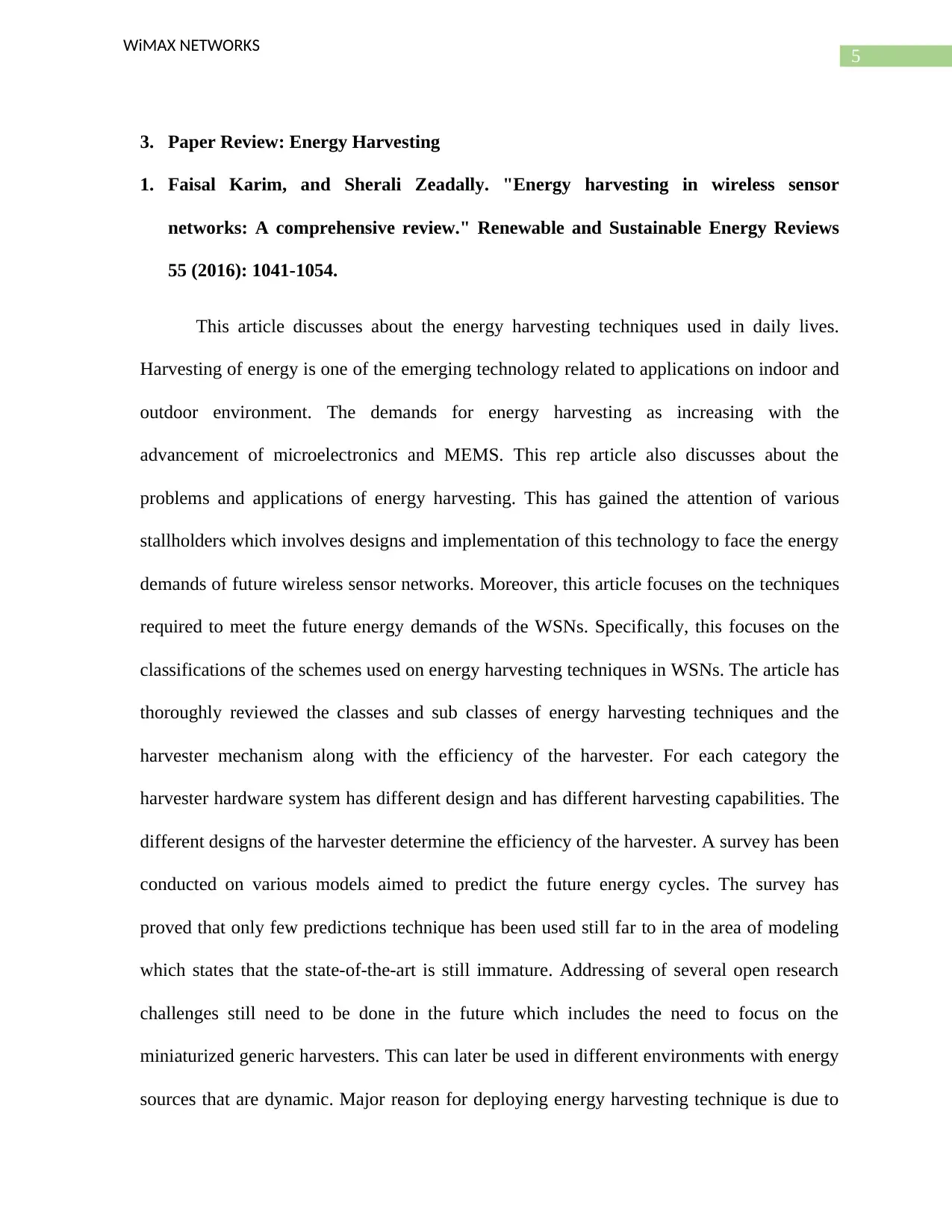
5
WiMAX NETWORKS
3. Paper Review: Energy Harvesting
1. Faisal Karim, and Sherali Zeadally. "Energy harvesting in wireless sensor
networks: A comprehensive review." Renewable and Sustainable Energy Reviews
55 (2016): 1041-1054.
This article discusses about the energy harvesting techniques used in daily lives.
Harvesting of energy is one of the emerging technology related to applications on indoor and
outdoor environment. The demands for energy harvesting as increasing with the
advancement of microelectronics and MEMS. This rep article also discusses about the
problems and applications of energy harvesting. This has gained the attention of various
stallholders which involves designs and implementation of this technology to face the energy
demands of future wireless sensor networks. Moreover, this article focuses on the techniques
required to meet the future energy demands of the WSNs. Specifically, this focuses on the
classifications of the schemes used on energy harvesting techniques in WSNs. The article has
thoroughly reviewed the classes and sub classes of energy harvesting techniques and the
harvester mechanism along with the efficiency of the harvester. For each category the
harvester hardware system has different design and has different harvesting capabilities. The
different designs of the harvester determine the efficiency of the harvester. A survey has been
conducted on various models aimed to predict the future energy cycles. The survey has
proved that only few predictions technique has been used still far to in the area of modeling
which states that the state-of-the-art is still immature. Addressing of several open research
challenges still need to be done in the future which includes the need to focus on the
miniaturized generic harvesters. This can later be used in different environments with energy
sources that are dynamic. Major reason for deploying energy harvesting technique is due to
WiMAX NETWORKS
3. Paper Review: Energy Harvesting
1. Faisal Karim, and Sherali Zeadally. "Energy harvesting in wireless sensor
networks: A comprehensive review." Renewable and Sustainable Energy Reviews
55 (2016): 1041-1054.
This article discusses about the energy harvesting techniques used in daily lives.
Harvesting of energy is one of the emerging technology related to applications on indoor and
outdoor environment. The demands for energy harvesting as increasing with the
advancement of microelectronics and MEMS. This rep article also discusses about the
problems and applications of energy harvesting. This has gained the attention of various
stallholders which involves designs and implementation of this technology to face the energy
demands of future wireless sensor networks. Moreover, this article focuses on the techniques
required to meet the future energy demands of the WSNs. Specifically, this focuses on the
classifications of the schemes used on energy harvesting techniques in WSNs. The article has
thoroughly reviewed the classes and sub classes of energy harvesting techniques and the
harvester mechanism along with the efficiency of the harvester. For each category the
harvester hardware system has different design and has different harvesting capabilities. The
different designs of the harvester determine the efficiency of the harvester. A survey has been
conducted on various models aimed to predict the future energy cycles. The survey has
proved that only few predictions technique has been used still far to in the area of modeling
which states that the state-of-the-art is still immature. Addressing of several open research
challenges still need to be done in the future which includes the need to focus on the
miniaturized generic harvesters. This can later be used in different environments with energy
sources that are dynamic. Major reason for deploying energy harvesting technique is due to
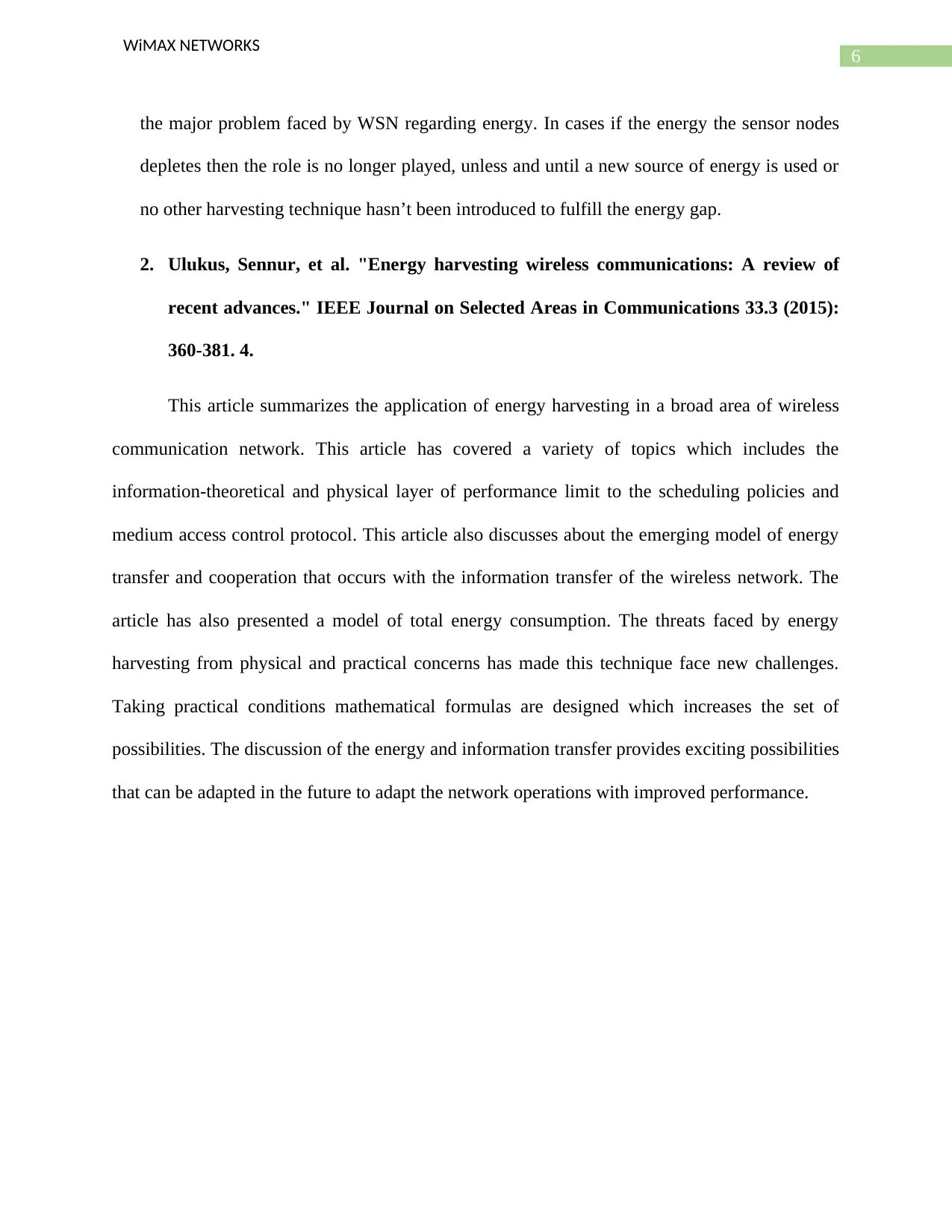
6
WiMAX NETWORKS
the major problem faced by WSN regarding energy. In cases if the energy the sensor nodes
depletes then the role is no longer played, unless and until a new source of energy is used or
no other harvesting technique hasn’t been introduced to fulfill the energy gap.
2. Ulukus, Sennur, et al. "Energy harvesting wireless communications: A review of
recent advances." IEEE Journal on Selected Areas in Communications 33.3 (2015):
360-381. 4.
This article summarizes the application of energy harvesting in a broad area of wireless
communication network. This article has covered a variety of topics which includes the
information-theoretical and physical layer of performance limit to the scheduling policies and
medium access control protocol. This article also discusses about the emerging model of energy
transfer and cooperation that occurs with the information transfer of the wireless network. The
article has also presented a model of total energy consumption. The threats faced by energy
harvesting from physical and practical concerns has made this technique face new challenges.
Taking practical conditions mathematical formulas are designed which increases the set of
possibilities. The discussion of the energy and information transfer provides exciting possibilities
that can be adapted in the future to adapt the network operations with improved performance.
WiMAX NETWORKS
the major problem faced by WSN regarding energy. In cases if the energy the sensor nodes
depletes then the role is no longer played, unless and until a new source of energy is used or
no other harvesting technique hasn’t been introduced to fulfill the energy gap.
2. Ulukus, Sennur, et al. "Energy harvesting wireless communications: A review of
recent advances." IEEE Journal on Selected Areas in Communications 33.3 (2015):
360-381. 4.
This article summarizes the application of energy harvesting in a broad area of wireless
communication network. This article has covered a variety of topics which includes the
information-theoretical and physical layer of performance limit to the scheduling policies and
medium access control protocol. This article also discusses about the emerging model of energy
transfer and cooperation that occurs with the information transfer of the wireless network. The
article has also presented a model of total energy consumption. The threats faced by energy
harvesting from physical and practical concerns has made this technique face new challenges.
Taking practical conditions mathematical formulas are designed which increases the set of
possibilities. The discussion of the energy and information transfer provides exciting possibilities
that can be adapted in the future to adapt the network operations with improved performance.
Secure Best Marks with AI Grader
Need help grading? Try our AI Grader for instant feedback on your assignments.
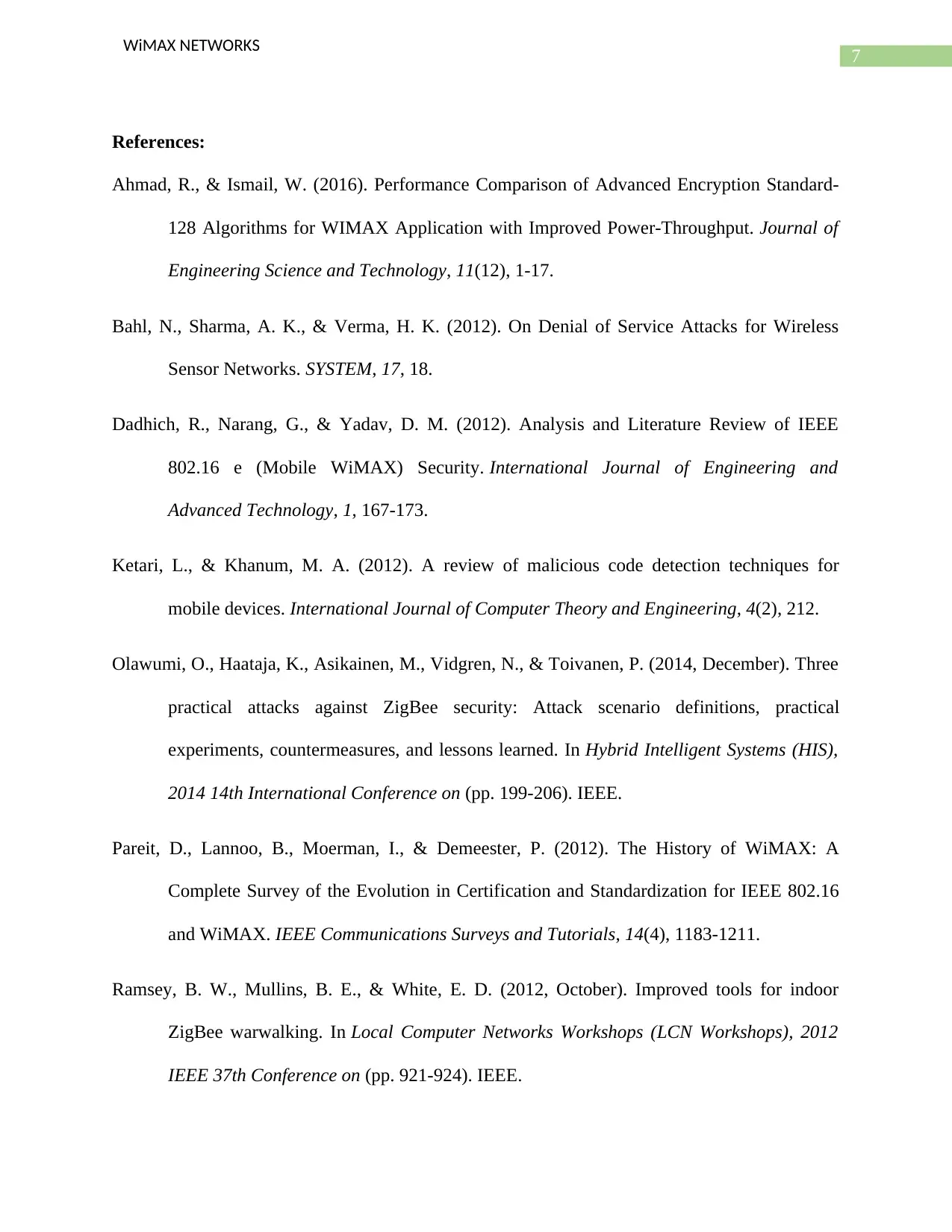
7
WiMAX NETWORKS
References:
Ahmad, R., & Ismail, W. (2016). Performance Comparison of Advanced Encryption Standard-
128 Algorithms for WIMAX Application with Improved Power-Throughput. Journal of
Engineering Science and Technology, 11(12), 1-17.
Bahl, N., Sharma, A. K., & Verma, H. K. (2012). On Denial of Service Attacks for Wireless
Sensor Networks. SYSTEM, 17, 18.
Dadhich, R., Narang, G., & Yadav, D. M. (2012). Analysis and Literature Review of IEEE
802.16 e (Mobile WiMAX) Security. International Journal of Engineering and
Advanced Technology, 1, 167-173.
Ketari, L., & Khanum, M. A. (2012). A review of malicious code detection techniques for
mobile devices. International Journal of Computer Theory and Engineering, 4(2), 212.
Olawumi, O., Haataja, K., Asikainen, M., Vidgren, N., & Toivanen, P. (2014, December). Three
practical attacks against ZigBee security: Attack scenario definitions, practical
experiments, countermeasures, and lessons learned. In Hybrid Intelligent Systems (HIS),
2014 14th International Conference on (pp. 199-206). IEEE.
Pareit, D., Lannoo, B., Moerman, I., & Demeester, P. (2012). The History of WiMAX: A
Complete Survey of the Evolution in Certification and Standardization for IEEE 802.16
and WiMAX. IEEE Communications Surveys and Tutorials, 14(4), 1183-1211.
Ramsey, B. W., Mullins, B. E., & White, E. D. (2012, October). Improved tools for indoor
ZigBee warwalking. In Local Computer Networks Workshops (LCN Workshops), 2012
IEEE 37th Conference on (pp. 921-924). IEEE.
WiMAX NETWORKS
References:
Ahmad, R., & Ismail, W. (2016). Performance Comparison of Advanced Encryption Standard-
128 Algorithms for WIMAX Application with Improved Power-Throughput. Journal of
Engineering Science and Technology, 11(12), 1-17.
Bahl, N., Sharma, A. K., & Verma, H. K. (2012). On Denial of Service Attacks for Wireless
Sensor Networks. SYSTEM, 17, 18.
Dadhich, R., Narang, G., & Yadav, D. M. (2012). Analysis and Literature Review of IEEE
802.16 e (Mobile WiMAX) Security. International Journal of Engineering and
Advanced Technology, 1, 167-173.
Ketari, L., & Khanum, M. A. (2012). A review of malicious code detection techniques for
mobile devices. International Journal of Computer Theory and Engineering, 4(2), 212.
Olawumi, O., Haataja, K., Asikainen, M., Vidgren, N., & Toivanen, P. (2014, December). Three
practical attacks against ZigBee security: Attack scenario definitions, practical
experiments, countermeasures, and lessons learned. In Hybrid Intelligent Systems (HIS),
2014 14th International Conference on (pp. 199-206). IEEE.
Pareit, D., Lannoo, B., Moerman, I., & Demeester, P. (2012). The History of WiMAX: A
Complete Survey of the Evolution in Certification and Standardization for IEEE 802.16
and WiMAX. IEEE Communications Surveys and Tutorials, 14(4), 1183-1211.
Ramsey, B. W., Mullins, B. E., & White, E. D. (2012, October). Improved tools for indoor
ZigBee warwalking. In Local Computer Networks Workshops (LCN Workshops), 2012
IEEE 37th Conference on (pp. 921-924). IEEE.
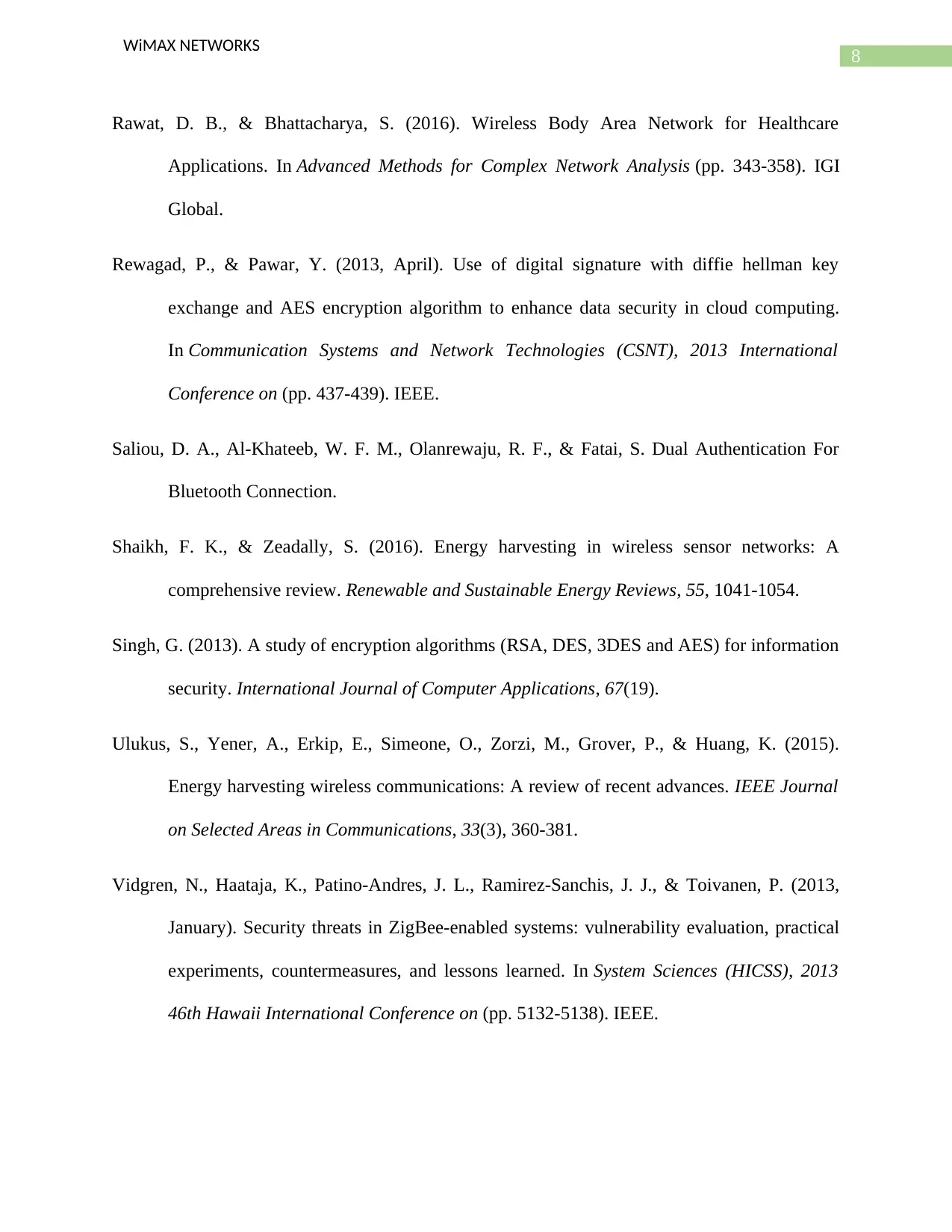
8
WiMAX NETWORKS
Rawat, D. B., & Bhattacharya, S. (2016). Wireless Body Area Network for Healthcare
Applications. In Advanced Methods for Complex Network Analysis (pp. 343-358). IGI
Global.
Rewagad, P., & Pawar, Y. (2013, April). Use of digital signature with diffie hellman key
exchange and AES encryption algorithm to enhance data security in cloud computing.
In Communication Systems and Network Technologies (CSNT), 2013 International
Conference on (pp. 437-439). IEEE.
Saliou, D. A., Al-Khateeb, W. F. M., Olanrewaju, R. F., & Fatai, S. Dual Authentication For
Bluetooth Connection.
Shaikh, F. K., & Zeadally, S. (2016). Energy harvesting in wireless sensor networks: A
comprehensive review. Renewable and Sustainable Energy Reviews, 55, 1041-1054.
Singh, G. (2013). A study of encryption algorithms (RSA, DES, 3DES and AES) for information
security. International Journal of Computer Applications, 67(19).
Ulukus, S., Yener, A., Erkip, E., Simeone, O., Zorzi, M., Grover, P., & Huang, K. (2015).
Energy harvesting wireless communications: A review of recent advances. IEEE Journal
on Selected Areas in Communications, 33(3), 360-381.
Vidgren, N., Haataja, K., Patino-Andres, J. L., Ramirez-Sanchis, J. J., & Toivanen, P. (2013,
January). Security threats in ZigBee-enabled systems: vulnerability evaluation, practical
experiments, countermeasures, and lessons learned. In System Sciences (HICSS), 2013
46th Hawaii International Conference on (pp. 5132-5138). IEEE.
WiMAX NETWORKS
Rawat, D. B., & Bhattacharya, S. (2016). Wireless Body Area Network for Healthcare
Applications. In Advanced Methods for Complex Network Analysis (pp. 343-358). IGI
Global.
Rewagad, P., & Pawar, Y. (2013, April). Use of digital signature with diffie hellman key
exchange and AES encryption algorithm to enhance data security in cloud computing.
In Communication Systems and Network Technologies (CSNT), 2013 International
Conference on (pp. 437-439). IEEE.
Saliou, D. A., Al-Khateeb, W. F. M., Olanrewaju, R. F., & Fatai, S. Dual Authentication For
Bluetooth Connection.
Shaikh, F. K., & Zeadally, S. (2016). Energy harvesting in wireless sensor networks: A
comprehensive review. Renewable and Sustainable Energy Reviews, 55, 1041-1054.
Singh, G. (2013). A study of encryption algorithms (RSA, DES, 3DES and AES) for information
security. International Journal of Computer Applications, 67(19).
Ulukus, S., Yener, A., Erkip, E., Simeone, O., Zorzi, M., Grover, P., & Huang, K. (2015).
Energy harvesting wireless communications: A review of recent advances. IEEE Journal
on Selected Areas in Communications, 33(3), 360-381.
Vidgren, N., Haataja, K., Patino-Andres, J. L., Ramirez-Sanchis, J. J., & Toivanen, P. (2013,
January). Security threats in ZigBee-enabled systems: vulnerability evaluation, practical
experiments, countermeasures, and lessons learned. In System Sciences (HICSS), 2013
46th Hawaii International Conference on (pp. 5132-5138). IEEE.
1 out of 9
![[object Object]](/_next/static/media/star-bottom.7253800d.svg)





